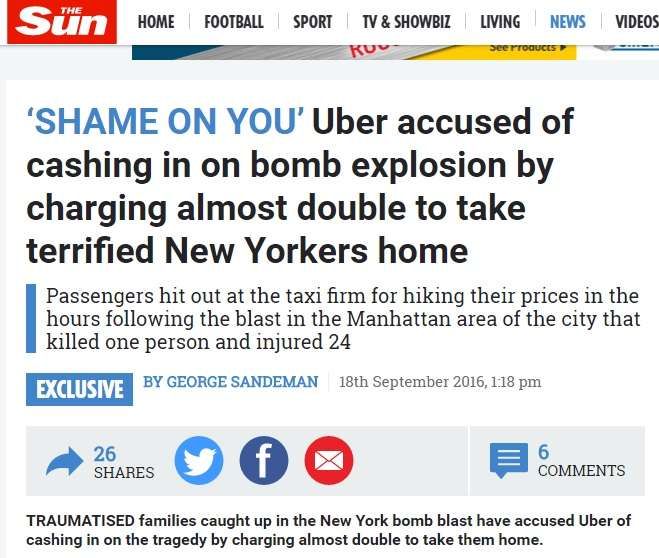Did Uber Price-Gouge Terrified New Yorkers after Explosion or Just Make Sure They Got Home?
Ride-sharing company stupidly attacked after prices went up in Manhattan area wracked by terroristic violence.

Uber, the ride-sharing app that has revolutionized transportation options across the developed world, utilizes "surge pricing," meaning that prices go up if demand is higher than usual. This happens predictably during rush hour and around a concert and sports venues letting out and less predictably around big weather events, and…violent episodes such as the bomb blast that happened over the weekend in the Chelsea section of New York City.
A number of reports say that prices went up by as much as 1.8 times 80 percent of normal fares in the aftermath of the blast. Cue moral outrage.
.@Uber doubled prices to take terrified New Yorkers home after last night's explosion https://t.co/mYty3mtqSo pic.twitter.com/fsSNtrdbWV
— Billy Corben (@BillyCorben) September 18, 2016
Activist and New York Daily News columnist Shaun King, among others, verified the price hikes:
This is true. My family and I were out in Manhattan and many of our train lines were closed. Uber prices surged up. https://t.co/BjbsWeT1Vy
— Shaun King (@ShaunKing) September 18, 2016
And here's how the U.K.'s Sun wrote up its reporting on the matter:

Let's rewrite that headline to better reflect better basic economics: "Uber increases fares by almost double to incentivize drivers to take terrified New Yorkers home."
People who get flipped out by real-time pricing—and it happens every time there's a big blizzard, traffic jam, or anything else—should also recognize that drivers are people too. All things being equal, they don't want to go out during a snowstorm any more than the rest of us, and they're not keen on picking up fares (or even being on the road) when bombs are exploding. While customers understandably concentrate on fare hikes, it's equally important to realize that drivers need a reason to pull an extra shift, especially in times of danger. That's precisely what surge pricing does, by hiking compensation. This is one reason why every city in America that I know of authorizes emergency rates that typically double normal taxi fares during extreme weather and other events.
In 2014, Uber entered an agreement with New York state's attorney general to cap surge pricing during emergencies. But despite an apparently widely shared misunderstanding to the contrary, that didn't mean it wouldn't use surge pricing during "abnormal disruption[s] of the market," only that it wouldn't jack rates super-sky-high. In fact, Uber has publicly stated that in the Big Apple, emergency fares won't top 2.8 times the regular fare (different cities have different agreements; in Boston, for instance, the multiple is 2.9). Another ride-sharing service, Lyft, says it never raises emergency fares more than 200 percent of regular fares.
The moral apoplexy that always surfaces in situations like this is understandable but totally misguided and founded on ignorance and lack of empathy with the very drivers that so many Uber-haters (such as Hillary Clinton and Bernie Sanders) say are being taken advantage of by the company's heartless inventors. Go figure.
In 2015, Reason's Jim Epstein took a long look at what he called "Uber and the Great Taxicab Collapse." Check it out below or here.


Show Comments (81)